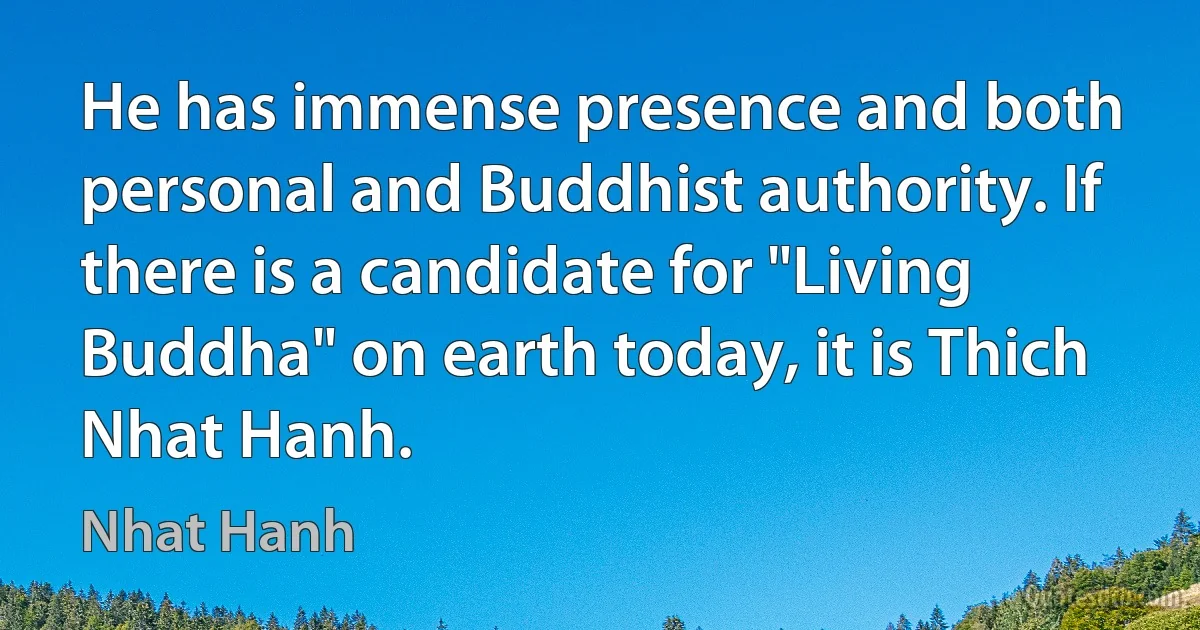Authority Quotes - page 71
True character arises from a deeper well than religion. It is the internalization of moral principles of a society, augmented by those tenets personally chosen by the individual, strong enough to endure through trials of solitude and adversity. The principles are fitted together into what we call integrity, literally the integrated self, wherein personal decisions feel good and true. Character is in turn the enduring source of virtue. It stands by itself and excites admiration in others. It is not obedience to authority, and while it is often consistent with and reinforced by religious belief, it is not piety.

E. O. Wilson
I guess you could say that I was somewhat withdrawn from my classmates. I spent a good deal of time being a loner. I suppose that had something to do with the way we lived - always on the move, never living in one town very long. It's very hard to make lasting friendships that way. And my father was rather strict with me and my two younger sisters. He insisted on proper behaviour and very often vetoed our choices of boyfriends. There was always a curfew whenever my sisters or I would go out on a date - we had to be home on time or else. But I never resented his authority. In fact, I'm thankful for my strict upbringing; I feel it has helped me learn discipline - and that's very important in this business.

Sharon Tate
Note the difference between a right and a privilege. A right, in the abstract, is a fact; it is not a thing to be given, established, or conferred; it is. Of the exercise of a right power may deprive me; of the right itself, never. Privilege, in the abstract, does not exist; there is no such thing. Rights recognized, privilege is destroyed.
But, in the practical, the moment you admit a supreme authority, you have denied rights. Practically the supremacy has all the rights, and no matter what the human race possesses, it does so merely at the caprice of that authority.

Voltairine de Cleyre
We know Mr. Gladstone is an authority...that the Soudanese are struggling for their liberty. My impression of the matter is that the Soudanese are struggling for abridging the liberty of other people in the shape of the slave trade. (Laughter and cheers.)

Robert Gascoyne-Cecil, 3rd Marquess of Salisbury
We can come through this trying time stronger, and with a renewed sense of purpose and respect for one another. The pandemic has shown us that it is not only our troops who are willing to offer the ultimate sacrifice for the safety of the community. Americans in hospitals, grocery stores, post offices, and elsewhere have put their lives on the line in order to serve their fellow citizens and their country. We know that we are better than the abuse of executive authority that we witnessed in Lafayette Square. We must reject and hold accountable those in office who would make a mockery of our Constitution. At the same time, we must remember Lincoln's "better angels," and listen to them, as we work to unite.
Only by adopting a new path - which means, in truth, returning to the original path of our founding ideals - will we again be a country admired and respected at home and abroad.

James Mattis
If only one could ... But it required strength. The romantic life had been too hard for her. In morals as in politics anarchy is not for the weak. The small state, racked by internal dissension, invites the foreign conqueror. Proscription, martial law, the billeting of the rude troops, the tax collector, the unjust judge, anything, anything at all, is sweeter than responsibility. The dictator is also the scapegoat; in assuming absolute authority, he assumes absolute guilt; and the oppressed masses, groaning under the yoke, know themselves to be innocent as lambs, while they pray hypocritically for deliverance.

Mary McCarthy
Aileen and the dominie [Reverend Frank Barber], in their obliviousness, were illustrating the worst of what he had heard of the American character. A people given to argumentation, someone had said. And, whatever the subject, the debate was always between themselves - as though only their opinions counted - and was settled when they reached a conclusion or simply got tired, as the world had watched them do in Vietnam. At least Sophie had held her peace; perhaps, being Jewish, she lacked the authority to pontificate conferred on the others [the Wasps] as a birthright.

Mary McCarthy
It is not one, I think, of which we have any cause to be ashamed. We have endeavoured to exercise a steadying and moderating influence in the politics of the world, and I think and hope that we have conveyed not merely the impression, but the conviction that, whatever other Governments or countries may do, the British Government is never untrue to its word, is never disloyal to its colleagues or its allies, never does anything underhand or mean; and if this conviction be widespread, as I believe it to be, that is the real basis of the moral authority which the British Empire has long exerted and, I believe, will long continue to exert in the affairs of mankind.

George Curzon, 1st Marquess Curzon of Kedleston
The essential result of the French revolution was to establish the doctrine of popular sovereignty as the foundation of modern Europe, though with no more precise definition of that elusive category "the people" than that popular sovereignty was the antithesis of the personal authority of the monarch.

E. H. Carr
I bow before the authority of special men because it is imposed upon me by my own reason. I am conscious of my inability to grasp, in all its details and positive developments, any very large portion of human knowledge. The greatest intelligence would not be equal to a comprehension of the whole. Thence results, for science as well as for industry, the necessity of the division and association of labor. I receive and I give - such is human life. Each directs and is directed in his turn. Therefore there is no fixed and constant authority, but a continual exchange of mutual, temporary, and, above all, voluntary authority and subordination.

Mikhail Bakunin
Indeed:
Who says anarchy, says negation of government;
Who says negation of government, says affirmation of the people;
Who says affirmation of the people, says individual liberty;
Who says individual liberty, says sovereignty of each;
Who says sovereignty of each, says equality;
Who says equality, says solidarity or fraternity;
Who says fraternity, says social order;
By contrast:
Who says government, says negation of the people;
Who says negation of the people, says affirmation of political authority;
Who says affirmation of political authority, says individual dependency;
Who says individual dependency, says class supremacy;
Who says class supremacy, says inequality;
Who says inequality, says antagonism;
Who says antagonism, says civil war;
From which it follows that who says government, says civil war.

Anselme Bellegarrigue
The robots are not technologically minded. They were not built to be. They were built to bolster human vanity and pride, to meet a strange longing that seems to be built into the human ego-the need to have other humans (or a reasonable facsimile of other humans) to minister to our wants and needs, human slaves to be dominated, human beings over which a man or woman (or a child) can assert authority, thus building up a false feeling of superiority.

Clifford D. Simak
He [the Grand Inquisitor] seriously regards it as a great service done by himself, his brother monks and Jesuits, to humanity, to have conquered and subjected unto their authority that freedom, and boasts that it was done but for the good of the world... Man is born a rebel, and can rebels be ever happy?...

Jesus Christ
Art is this intense form of individualism that makes the public try to exercise over it an authority that is as immoral as it is ridiculous, and as corrupting as it is contemptible. It is not quite their fault. The public have always, and in every age, been badly brought up. They are continually asking Art to be popular, to please their want of taste, to flatter their absurd vanity, to tell them what they have been told before, to show them what they ought to be tired of seeing, to amuse them when they feel heavy after eating too much, and to distract their thoughts when they are wearied of their own stupidity. Now Art should never try to be popular. The public should try to make itself artistic.

Oscar Wilde
This great principle is that the Constitution and the laws made in pursuance thereof are supreme; that they control the Constitution and laws of the respective States, and cannot be controlled by them. From this, which may be almost termed an axiom, other propositions are deduced as corollaries, on the truth or error of which, and on their application to this case, the cause has been supposed to depend. These are, 1st. That a power to create implies a power to preserve; 2d. That a power to destroy, if wielded by a different hand, is hostile to, and incompatible with these powers to create and to preserve; 3d. That, where this repugnancy exists, that authority which is supreme must control, not yield to that over which it is supreme.

John Marshall
The diminishing standing of public authorities in matters of morality and personal relationships in no way supposed a decline in the role of the state in the cultural affairs of the nation. Quite the contrary. The broad Western European consensus of the age held that only the state had the resources to service the cultural needs of its citizens: left to themselves, individuals and communities would lack both means and initiative. It was the responsibility of a well-run public authority to deliver cultural nourishment no less than food, lodging and employment. In such matters Social and Christian Democrats thought alike, and both were heir to the great Victorian-era improvers, though with far greater resources to hand. The aesthetic revolt of the Sixties changed little in this respect: the new (‘counter-') culture demanded and obtained the same funding as the old.

Tony Judt
Purity of heart will not make us poor. The exaltation of poverty as a spiritual virtue is of the ego, not the spirit. A person acting from a motivation of contribution and service rises to such a level of moral authority, that worldly success is a natural result.
Give all your gifts away in service to the world. If you want to paint, don't wait for a grant. Paint a wall in your town that looks drab and uninviting. You never know who's going to see that wall. Whatever it is you want to do, give it away in service to your community.

Marianne Williamson
KFI's John Ziegler is not a journalist - he is an entertainer. Or maybe it's better to say that he is part of a peculiar, modern, and very popular type of news industry, one that manages to enjoy the authority and influence of journalism without the stodgy constraints of fairness, objectivity, and responsibility that make trying to tell the truth such a drag for everyone involved. It is a frightening industry, though not for any of the simple reasons most critics give.

David Foster Wallace



